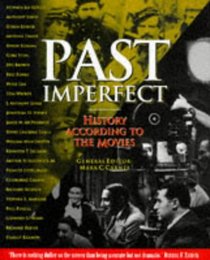In this title, over sixty historians contribute essays critically examining nearly 100 historical films. A number of the essays cover more than one film on a subject, such as an essay on two films about Lincoln, or one dealing with six films about Wyatt Earp.
While a number of the essays clearly point out which aspects of historical events or people were altered by Hollywood to make a 'better' movie so as to increase ticket sales, some of the essays are written as if the historians were writing a journal article, leaving you to wonder what he or she found incorrect about the movie besides some esoteric, historical theory.
A common error the historians pointed out is Hollywood's disinterest in keeping the timing of events in their proper order. For example, I was aware, before reading it in the essay, that in the movie "The Charge of the Light Brigade" the screenwriters made the purpose of the charge an attempt to kill a Muslim leader who had butchered British prisoners during the Indian Sepoy Mutiny, when the Mutiny didn't even happen until a few years after the "Charge" took place.
In some cases you wonder if the historians did their homework. For example, a side-bar for the movie Glory, a film on the famous 54th Massachusetts during the American Civil War, the historian includes a side-bar about Afro-Americans receiving less pay than white troops. The historian states that they were paid $13 per month but had to give back $3 to pay for uniforms. However, this was true of all Union soldiers, white and black. In the case of the Afro-American units, they were paid $10 per month, and still had to give $3 back for uniforms. The reasoning was that Afro-American units would not be used for active campaigning, which ended up being incorrect. Fortunately, Congress eventually corrected this and most Afro-American units received back pay. I found other errors on side bars for other movies.
Either the authors of those essays or the editor had an "Imperfect" notion of history, as the book does not state that the side-bars were added by the historians or were the editor's contribution. But surely, the historian had an opportunity to review the final draft.
This makes you wonder what other errors might have crept into the book.
As such, if you are really interested in history AND films, this is an interesting book to read. If your interest is less deep, you might be disappointed with the book, as even I was in a number of the essays.
While a number of the essays clearly point out which aspects of historical events or people were altered by Hollywood to make a 'better' movie so as to increase ticket sales, some of the essays are written as if the historians were writing a journal article, leaving you to wonder what he or she found incorrect about the movie besides some esoteric, historical theory.
A common error the historians pointed out is Hollywood's disinterest in keeping the timing of events in their proper order. For example, I was aware, before reading it in the essay, that in the movie "The Charge of the Light Brigade" the screenwriters made the purpose of the charge an attempt to kill a Muslim leader who had butchered British prisoners during the Indian Sepoy Mutiny, when the Mutiny didn't even happen until a few years after the "Charge" took place.
In some cases you wonder if the historians did their homework. For example, a side-bar for the movie Glory, a film on the famous 54th Massachusetts during the American Civil War, the historian includes a side-bar about Afro-Americans receiving less pay than white troops. The historian states that they were paid $13 per month but had to give back $3 to pay for uniforms. However, this was true of all Union soldiers, white and black. In the case of the Afro-American units, they were paid $10 per month, and still had to give $3 back for uniforms. The reasoning was that Afro-American units would not be used for active campaigning, which ended up being incorrect. Fortunately, Congress eventually corrected this and most Afro-American units received back pay. I found other errors on side bars for other movies.
Either the authors of those essays or the editor had an "Imperfect" notion of history, as the book does not state that the side-bars were added by the historians or were the editor's contribution. But surely, the historian had an opportunity to review the final draft.
This makes you wonder what other errors might have crept into the book.
As such, if you are really interested in history AND films, this is an interesting book to read. If your interest is less deep, you might be disappointed with the book, as even I was in a number of the essays.




